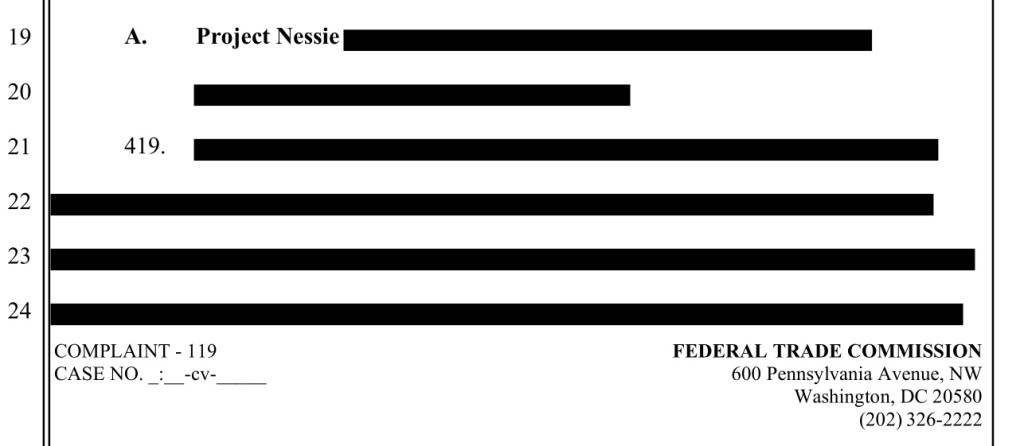The mysterious “Project Nessie,” hinted at in what little was not redacted in the FTC’s lawsuit against Amazon, is indeed an algorithmic pricing scheme that raised prices where it could do so safely, generating some $1.4 billion for the company during its years of operation. No wonder Amazon wanted to keep it under wraps!
The FTC’s allegations of anti-competitive behavior cover a number of different practices, among them price manipulation. And the poster child for this practice was Project Nessie.
Unfortunately, when the lawsuit was filed, it was full of redactions, and Nessie was clearly the biggest risk, with every mention and entire pages of the section dedicated to it blocked by black bars. But the process in court is that these redactions must be first honored and then defended — and clearly the argument of public interest won out over Amazon’s preference.
And so the newly unredacted lawsuit is sporting far fewer stripes, though the occasional proprietary or internal figure is still blocked out. But most importantly, we have a full account of Project Nessie:
Alongside these anti-discounting tactics, Amazon also goes a step further and hikes prices directly and outright. Amazon created a secret algorithm internally codenamed “Project Nessie” to identify specific products for which it predicts other online stores will follow Amazon’s price increases. When activated, this algorithm raises prices for those products and, when other stores follow suit, keeps the now-higher price in place.
Essentially, Amazon observed that other stores tended to follow the Amazon price on some products, but others didn’t. Say Amazon raised the price of a sheet set from $25 to $30. Perhaps Bed Bath & Beyond would raise their price too, but Walmart stood tough at $25. That’s not great for Amazon because it meant that customers might find that lower price and shop there instead.
But take another situation, where Amazon raises the price of a keyboard from $30 to $40. Perhaps the maker of that keyboard is the only other place that sells it, and they had matched Amazon’s price so as not to lose sales. So now they can safely raise it to $40 too. Bonanza! Amazon gets an extra $10, and no one can find a cheaper price anywhere. Of course, the customer loses $10.
By systematically analyzing which products and which competitors resulted in “safe” price increases like the latter, Amazon could arbitrarily raise prices and extract additional profit from customers like you and me. (For the record, the feature is in fact what I guessed it was from the little we could see in the original redacted document.)
Now, Amazon disputes this characterization of Nessie. In a comment issued to The Wall Street Journal when the outlet reported some of this information last month, they said the tool was intended to “try to stop our price matching from resulting in unusual outcomes where prices became so low that they were unsustainable. The project ran for a few years on a subset of products, but didn’t work as intended, so we scrapped it several years ago.”
The documents cited by the FTC paint a different picture. The project ran for five years, and whatever intentions Amazon had for it, it generated about $1.4 billion in additional profits. Amazon is quoted as deeming Project Nessie “an incredible success,” which somewhat contradicts their more recent statement. And if it was strictly about preventing “unsustainable” low prices, it doesn’t make sense that it would only target retailers that would match Amazon’s markups.
That it was “scrapped” is also questionable, since in 2022 the CEO of Worldwide Amazon Stores Doug Herrington suggested turning on “our old friend Nessie, perhaps with some new targeting logic” to boost retail profits. Nessie has indeed slipped under the waters, but the FTC is clear that it could just as easily emerge again if Amazon liked. Now that the heat is on, however, that seems unlikely.
I asked Amazon about these seeming contradictions and the company declined to comment beyond its original statement. They may, however, have more detailed refutations in store in their own court filings, though on this matter of Nessie, they may well decide that discretion is the better part of public opinion.































Comment